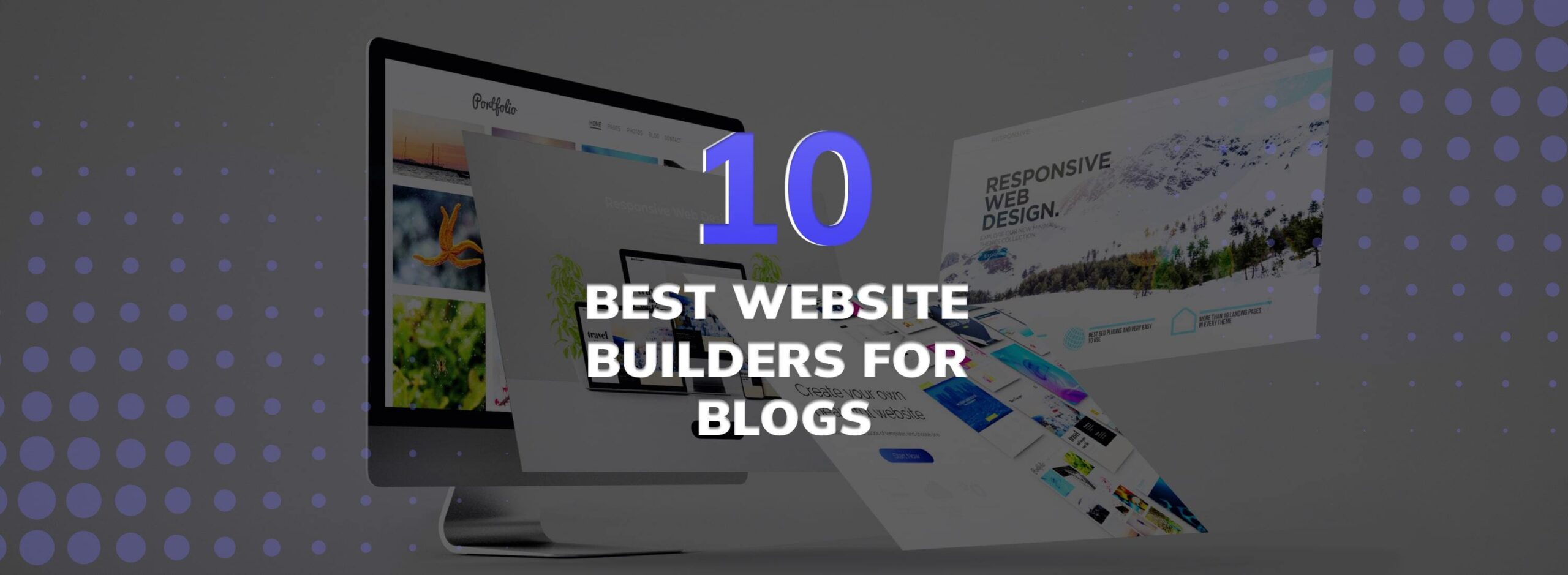Today, people can create their own blogging website without having any coding, programming, or design skills with website builders. This option makes it much easier to publish your content and images in digital space in minutes. However, with so many website builders out there, each claiming to be the best, it can take time to decide which to select for your blogging needs.
In this article, we’ll review the ten best website builders for blogs in 2023, considering their ease of use, design template, user interface, design flexibility, and overall blogging features.
The Top 10 Best website builders for Blogs
Here are our ten best blogging platforms arranged in no particular order.
#1. Wix
Wix has over 900 free blog templates you can customize to meet your blogging needs. This is why it’s one of the best website builders for travel blogs, news blogs, fashion blogs, movie blogs, and personal blogs. This blogging platform provides a complete collection of advanced design features and a rich text editor (including video and audio add-ons). The text editor gives you control over your blog’s look, and the design features let you build a unique blog that leaves a lasting impression. Wix also comes with free, reliable website hosting for your blog backup and a built-in analytics tool that gives insights into your content engagement.
Pros:
- Advanced design features
- Large free template library
- Reliable website hosting
Cons:
- Unintuitive user interface
- Slow loading speed
#2. Squarespace
Squarespace is a website builder ideal for building impressive, professional-looking blogs. It’s packed with hundreds of modern design templates that you can customize to fit your styles and professional needs. It features essential blogging tools that allow easy blog categorizing, content sharing, comments, social sharing, and post scheduling. Squarespace also features a mobile app that includes all the editing tools you need to publish your blog posts, upload images, and add new pages while on the go. Its marketing and built-in SEO tools help boost your content engagement and increase your position on SERPs.
Pros:
- A vast collection of modern design templates
- Sophisticated blogging features
- Great blog editing tools
Cons:
- Not very intuitive
- No free domain
#3. Weebly
Weebly is a site builder that allows personal bloggers to build their websites in real-time from their web browsers without having to install anything. Its intuitive editor makes it much easier for non-designers to create good blogs, while its App Center simplifies the editor for further ease of use. This website builder has several blogging features that allow for different user profiles, social bookmarking, built-in search, and viewer comments. With this blogging platform, you can add certain content elements (like text, photos, maps, and videos) to your blog and customize it using its drag-and-drop elements. You can also edit your text like you do in a word processor and leverage its custom fonts and themes for beautiful website creation.
Pros:
- Real-time website creation
- Free custom domain name
- Excellent blogging features
Cons:
- Limited custom analytics
- Lack customization
#4. WordPress.com
WordPress.com is one of the most traditionally popular blogging platforms for creating a unique blog website. The platform comes with several relevant plugins and templates that focus on blogging. This blogging site provides you with what you need (including free hosting, your own domain, and a functional support team ) to build a website that fits your blogging needs. It also comes with a drag-and-drop design tool to add images and embed audio, videos, and other documents into your posts and pages. WordPress.com features a suite of beautiful themes for recipe blogs, making it one of the best website builders for food blogs.
Pros:
- Advanced blogging features
- Secure hosting
- Vast collections of beautiful templates
Cons:
- Not intuitive
- Limited customer support
#5. GoDaddy
GoDaddy is a site builder for creating a small blog in minutes. It has an intuitive editor and user interface that’s easy to navigate, regardless of your design skill level. With GoDaddy, you can access a range of marketing tools (upon subscription), including integrated social media and email marketing tools, a native content creator, and a great marketing planner. There’s also a blog manager functionality for easy content creation and management and robust analytics that help track your content engagement. GoDaddy blogging platform is renowned for its Artificial Design Intelligence (ADI) builder, which creates a quick website for you based on your answer to a questionnaire.
Pros:
- Excellent ADI builder
- Excellent blog manager functionality
- Powerful analytics
Cons:
- Not ideal for a growing blog
- Basic SEO option
#6. Zyro
Zyro is a website builder ideal for creating simple, classic blogs. It features a solid ADI builder that builds a quick blogging website based on your answer to a few questions. This site builder features 100+ stylish templates for blogs that you can customize (change colors, text, fonts, images, and more) to your style and personal needs using its drag-and-drop editor. Zyro comes with relevant blogging features that allow for social sharing, multiple writer profiles, and powerful SEO and marketing tools to grow your online presence.
Pros:
- Easy to use
- Powerful ADI builder for quicker website creation
- Competitive Pricing
Cons:
- No comment system
- No blog search
#7. Jimdo
Jimdo is a free blogging platform with a flexible layout for creating a simple blog. It provides you with the necessary blogging tools to design your website for your style and personal needs. Its AI tools will automatically create a website for you after answering a basic questionnaire about your website’s purpose. Jimdo’s content elements allow you to add your own text and images, photo gallery, columns, and buttons. This design flexibility gives you complete control over your website design. With its page builder, you can add the post’s date, title, category, status, summary, and image preview.
Pros:
- Great page builder
- Design flexibility
- AI-powered tools for quick website creation
Cons:
- No custom domain for free plan
- Not ideal for a more extensive blogging website
#8. Webflow
Webflow is a site builder with ultra-reliable hosting for creating content-driven designs. The platform allows you to design your website around any content type your site need. It features an intuitive editor that you can utilize to update and edit content right on your page and see how your blog will look before you publish. Webflow comes with a complete Content Management Solution (CMS) that editors, designers, developers, and content strategists find helpful. This feature lets you build the exact schema you need for your blog and connect it to any design you choose.
Pros:
- Excellent for creating and publishing new content in minutes
- Free domain name
- Very reliable hosting
Cons:
- Not beginner-friendly
- Expensive pricing
#9. SITE123
SITE123 is a simple site builder for creating small, personal blogs in a few minutes. With its step-by-step website creation process, you’ll get to start your own blog website, even if you’re new to blogging. It comes with ready-made styles and layouts to create your simple blogs. It offers free web hosting and an intuitive website editor to edit your website. There are several blogging features that SITE123 makes available to users, which range from commenting systems to RSS feeds, blog post scheduling, and social media interaction. With this site builder, you can create a free website for blogging and manage your blog content using its content management system.
Pros:
- Easy, step-by-step website creation in minutes
- Essential blogging features
- Free web hosting
Cons:
- Elementary templates and designs
- Limited customization
#10. Strikingly
Strikingly is a site builder ideal for creating a personal, one-page website. It has an intuitive website editor (with a few relevant templates) that you can use to customize your website and publish your content instantly. Strikingly makes available the essential blogging features you need to create a website to your style. You can register a new domain name or use your existing domain name (after an upgrade) and add a sign-up/contact form to get feedback from the audience. Its other blogging features allow for post scheduling, content sharing on social media, and blog commenting. Its built-in analytic tools enable you to see who visits your blog and track content engagement.
Pros:
- Intuitive website editor
- Most relevant blogging features, such as social feed
- Comes with analytics built-in
Cons:
- Limited template
- Expensive paid plans
ConclusionWebsite builders can make your blogging life more interesting if you choose the right one. The best website builders for blogs are easy to use, come with the most critical blogging features, are affordable, and allow room for personal customization. You can try out our list of the top 10 best website builders for blogs in 2023 to see which is most appropriate for your blogging needs.






